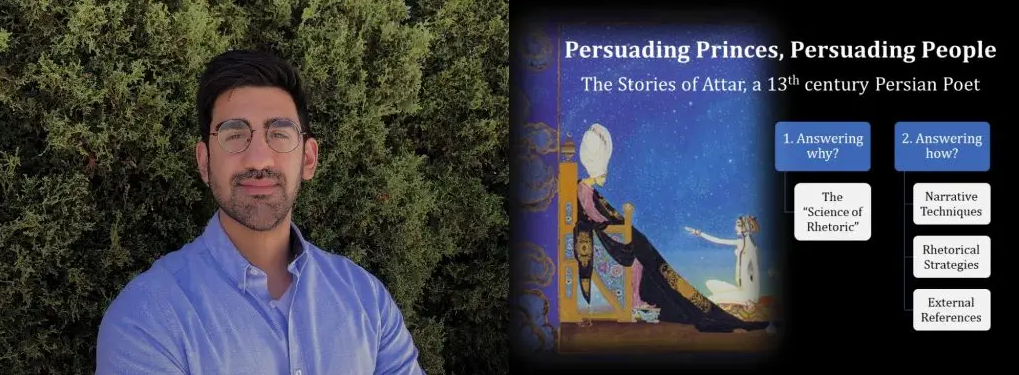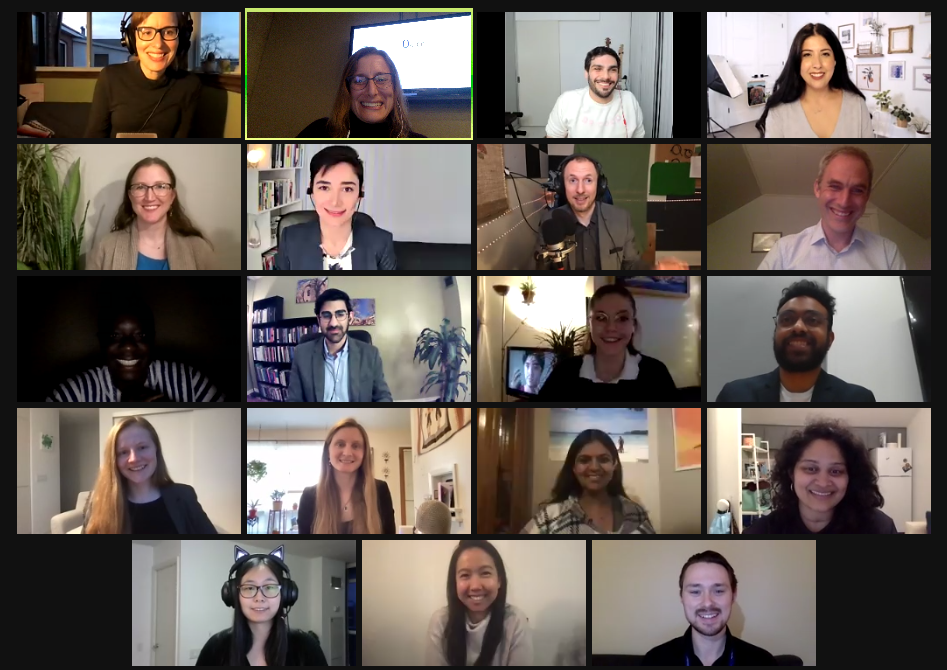PhD student wins 2021 Three Minute Thesis final for work on rhetoric in 13th-century Persian literature


What do short stories from medieval Persian literature teach us about political discourse today? Faraz Alidina can tell you, and in under three minutes. The third-year PhD student from the Department of Near and Middle Eastern Civilizations won the 2021 Three Minute Thesis (3MT) competition last week for his research on the works of 13th century Persian poet Farid al-Din Attar.
Alidina was one of a dozen competitors at the second virtual 3MT final on March 31 that saw graduate students from across U of T’s three campuses attempt to explain their research in under three minutes to a panel of non-specialist judges. The annual event, which was hosted by CBC Ideas producers Nicola Luksic and Tom Howell, had over 250 audience members cheering on the participants.
Alidina was pleasantly surprised by his win due to the preponderance of students in the sciences among the competition’s past winners. “I feel very grateful that I was able to win because historically, at least at U of T, this competition has been dominated by students in the sciences,” said the Markham native, who entered the competition at the encouragement of his supervisor, Professor Shafique Virani. “Part of that is because students in the humanities don’t participate. But it’s also very difficult, if you’re in the humanities, to summarize your research in under three minutes.”
For his presentation, the first-time competitor decided to take a creative approach. He began with the story of Shahrzad, that famed storyteller of the One Thousand and One Nights who hoped that her intriguing tales would delay her execution and persuade the murderous king to change his ways. Like Shahrzad, many writers in the medieval period— writing in Persian, Latin, Arabic, and Italian—realized that princes and people were best convinced not by means of abstract principle but rather through story. With his research, Alidina hopes to unpack the narrative techniques—or what the Arabic literary tradition calls the “science of rhetoric”— behind the short stories of the 13th century poet Farid al-Din Attar, a writer with a style so persuasive that critics sometimes referred to it as “the horsewhip.”
“These medieval authors used short stories not just to illustrate a point or an abstract ethical concept, but because stories actually provided a unique medium through which the consequences of ethical and political positions could be explored in their specificity,” Alidina said in a Zoom interview after the event. “Ironically, fiction is the best place where we can model the world as it is, in its uniqueness and its variance.”
That’s why probing medieval theories of persuasion is hardly an esoteric pursuit for Alidina, who holds a master’s degree in religion from Harvard and an undergraduate degree in political science and Middle Eastern Studies from McGill. He believes that understanding what persuades people has taken on new urgency in the age of alternative facts and conspiratorial thinking. Citing recent examples like Brexit, he pointed out that models attributing human action to self-interest couldn’t always explain political and electoral outcomes.
While he’s still in the early stages of developing his research, the PhD student said that preparing for 3MT helped him articulate the major questions underlying his work. “The format of the competition really forced me not to hide behind jargon, or prolixity, or complexity. And I thought that was a useful exercise, regardless of whether I came in first or didn’t make it past the first heat.”

Alidina hopes his victory will inspire more participation from students in the humanities. “In the humanities, we’re perhaps more inclined to have this purist vision of our intellectual lives— knowledge for the sake of knowledge. There’s nothing wrong with having that internal compass of curiosity, but that doesn’t mean we should shy away from thinking about how our work can play a role in the world in which we live.”
“The humanities has a very unique and specific voice, particularly in this time,” he continued. “We shouldn’t be afraid to speak a little louder.”
Alidina won $500 for his first-place finish in the 3MT finals. Heather MacDonald from the Faculty of Music took second spot for her presentation on preventing oboe-related injuries while Julie Sato from the Department of Psychology placed third for her work on postnatal nutrition and brain development in premature infants. Emily McGaugh from the Department of Physiology took home the People’s Choice Award for her presentation on how stem cells can help cure Type 1 diabetes.
Learn more about 3MT at the University of Toronto.
